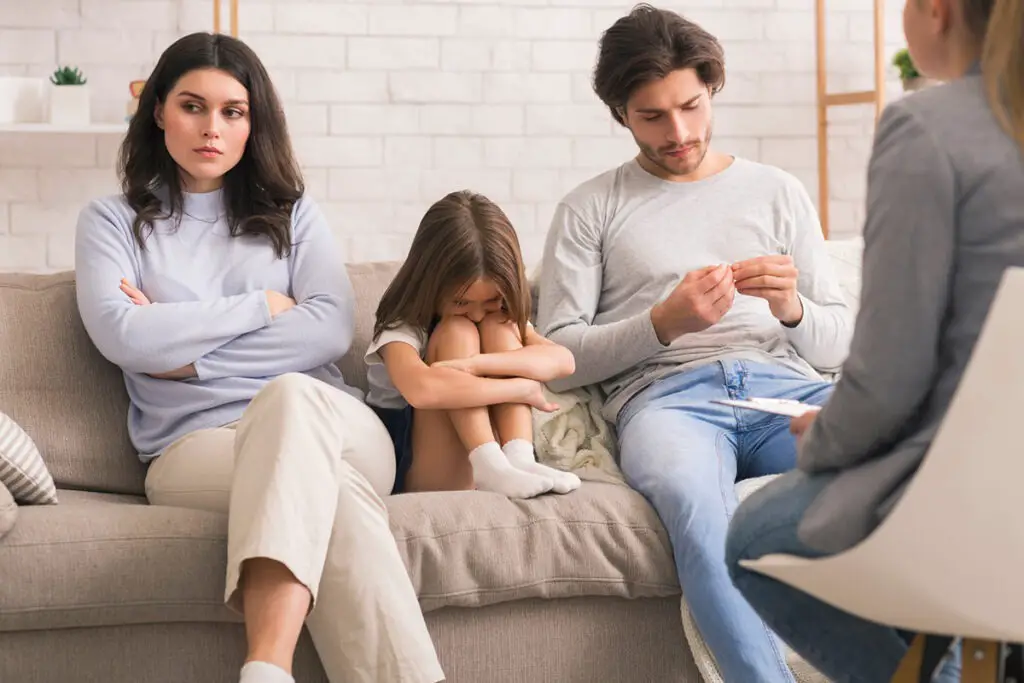Deciding to divorce is never easy, even with an amicable split. But it can still take its toll on both parents. However, following a divorce, a much higher percentage of dads shirk parental duties. But why do fathers walk away after a divorce?
Fathers may walk away from their kids after a divorce due to feeling overwhelmed, guilty, or not knowing how to express and deal with their emotions. And they may struggle to help their children deal with their own complicated feelings.
But they also might walk away because they never wanted to be a father in the first place, and now have no reason to stay.
And when fathers walk away once it is finalized, it can be even more devastating for the children.
I’ll further explain a few topics related to this question, including why he walked away after the divorce, how you can cope with the split, and how you can assist your kids in managing.
Reasons Why Fathers Walk Away After Divorce
While it’s easy to assume that some fathers leave their families simply because they’re jerks, this may not always be the case. However, in situations where the father is the abuser to both the children and the mother, it’s best if he is forgotten after a divorce.

Frequently, emotional turmoil can result in poor decision-making and lead one to believe they’re a burden to those around them. Sometimes a person’s safety response is flight instead of fight, causing them to up and leave rather than sticking it out.
1. They Feel Overwhelmed
While a divorce is overwhelming for all parties involved, some people can’t handle and manage the emotions that arise during and after a divorce. The feelings of loss, grief, and sadness are sometimes too much for one to deal with, so they adopt an “out of sight, out of mind” approach.
Remember, everyone has a different way of dealing with difficult feelings and circumstances.
Some fathers can cope with the effects of a divorce, and some can’t, so they walk away. In their eyes, walking away is more manageable than handling the separation.
2. They’re Unable To Cope With the Divorce
Walking away after a divorce due to the inability to cope with it is a common theme. After a split, the mental and emotional distance between parents can make it challenging to maintain a robust support system for the kids.
As a result, the father may believe that everyone would be better off if he left since there’s no longer a strong foundation.
If the father was seen as the crutch of the family, it puts a lot of pressure on him to maintain that role even after a divorce. The ripple effects of a split, such as feeling hopeless, can act as a catalyst for deciding to walk away.
The inability to cope with the divorce can result in the decision to leave for good, even if the relationship didn’t end on bad terms.
Men are less likely to seek help due to the traditional concepts of masculinity, such as:
- Men should be strong on their own.
- Men shouldn’t be vulnerable.
- Men shouldn’t ask for help.
Because of these traditional concepts, many men find it unacceptable to express their emotional pain, grief, and fears associated with the divorce.
That said, the traditional concepts of masculinity prevent men from learning how to effectively cope with emotionally straining situations, ultimately leading them to walk away from anything that could evoke an emotional reaction.
3. They Feel Anger and Resentment
Most of the time, the anger and resentment are towards themselves, as it’s common for fathers to feel like a failure after a divorce. However, they may start to project this anger onto everyone around them to avoid feeling that way towards themselves.
Many men aren’t comfortable feeling emotions like sadness, so anger often feels most suitable.

They may also feel resentment towards their ex-spouse since divorce courts have a reputation for being in favor of the mom. It’s common for fathers to think that the odds are stacked against them in court, ultimately viewing them as the villain. This anger and resentment can cause a lot of tension within the household, prompting the father to walk away.
4. They May Have Avoidant Tendencies
If we consider the traditional upbringing of men, we can conclude that they’re taught not to be vulnerable and “emotional.” A conventional upbringing may teach them that they shouldn’t be comfortable with the inevitable emotions they’ll experience, and in essence, feel shame when they do.
Being uncomfortable with their feelings can lead to avoidant behavior, with the intention of upholding their definition of what a man is.
Avoidant behavior is problematic and can result in a father walking away after a divorce. As I mentioned before, taking an out-of-sight, out-of-mind approach may be the father’s way of handling the split.
By avoiding the situation altogether, they won’t have to deal with the complicated feelings that arise and won’t have to endure the discomfort of being on an emotional rollercoaster.
While these may be the reasons why the father walked away after the divorce, there’s also the possibility that he didn’t want kids in the first place. I understand that this unfortunate truth is upsetting, but please don’t hold yourself responsible or blame yourself for the way things turned out if you have no reason to.
Ways You Can Cope With the Divorce
A divorce can feel like losing a huge chunk of your identity. It may be difficult to remember who you were before you got married and your identity outside of that person since they were such a big part of your life and played their role in who you are today. That said, you must deal with the divorce in ways that aren’t detrimental to you.
There are a few ways you can healthily cope with a father walking away after a divorce. These include:
- Don’t blame yourself. The father decided to walk away, and you’re not responsible for his actions.
- Take it one day at a time. The healing process isn’t linear. Some days will be far worse than others, and you need to allow yourself to go through the turmoil. Don’t rush yourself to get over it or suppress your feelings, as this will only make them more difficult to handle. Give yourself time.
- Start doing things for yourself. After being in a “we” mindset for some time, you may have forgotten what it’s like to do something for yourself alone. It might be uncomfortable at first, but doing things for yourself is a great place to start. This can include giving yourself a spa day or finally buying that nice kitchen set you’ve been wanting.
- Pick up new hobbies or indulge in old ones. Whether you take a new pottery class or start going back to yoga classes, you’ll thank yourself for indulging in fun activities that you genuinely enjoy.
- Don’t be afraid to ask for help. Divorce isn’t something you should feel obligated to go through by yourself. Consider seeing a therapist if you find you’re not coping alone, or confide in a close friend instead.
- Find an outlet for your anger. If a part of you is angry, a great way to release the anger would be by going to a rage room. A rage room is a place where you can destroy anything while in protective gear. Going to a rage room can be highly therapeutic and an experience to remember. Other options would be taking up boxing, going to the gym, or even meditating. Explore ways that benefit you most when letting go of pent-up anger.
- Make plans with your girlfriends. Call your girlfriends and have a girl’s day/night if you have enough free time. Friendships tend to fade and become less important when you’re married, so spending time with your friends will be a breath of fresh air. If you’re more of an introvert, you can go on a solo date or have a relaxing day at home.
- Journal about it. Writing down your thoughts and feelings can help you relieve some frustration and sadness from the divorce.
It’s important to understand that you can’t allow yourself to feel unhappy forever because you deserve to be happy and content. Taking steps to accept and move past the divorce at your own pace is crucial for your mental health and general well-being.
How To Assist Your Kids in Coping With the Divorce
Unfortunately, a divorce can take a significant toll on your kids, which is why it’s essential that you assist them in handling their feelings and how they cope with the situation.

Here are a few ways you can assist your children in coping with the divorce:
- Make it clear that you’re there for them. Offering your support during this time will be the best thing you could do for your kids. They might be closed off at first, but all they need is the comfort of knowing that you’re in their corner.
- Let them know that your love for them hasn’t changed. Some kids may believe that because their parents divorced or because a parent left, they don’t love each other anymore and ultimately don’t love their kids anymore. Tell them that this isn’t the case.
- Allow your kids to express themselves. Let your child vent about the situation without downplaying their emotions. It’s vital that your kids can voice their feelings without feeling judged or invalidated. That way, they can ease their frustration healthily. By encouraging your kids to communicate, they’ll become more comfortable confronting their feelings rather than suppressing them.
- Let your kids know that it’s not their fault. Many kids believe that they were the cause of the divorce or that they had something to do with it. They’ll think about times they were bad and assume that’s the reason you divorced. Comfort them and clarify that they weren’t the cause and shouldn’t feel guilty.
- Be comfortable with talking about the divorce. According to HelpGuide, talking about divorce is an ongoing process that is necessary. As your kids get older and more mature, they’ll have new questions and concerns about what happened and want more clarity.
- Provide stability through routines. Children feel secure and safe when they know what to expect. Having routines doesn’t mean you need to have a rigid schedule. You can be flexible, but ensure you have a routine you follow every day.
What Not To Do After a Divorce
While you might be hurting and need to express this pain to someone, there are certain things you probably shouldn’t do when the father is absent.
For one, children still need stability after this big life-changing event and need you more than ever. But more than that, they need to know that just because their father doesn’t come around doesn’t mean that you’ll leave them too.

Here are some things you shouldn’t do after a divorce:
- Don’t neglect your mental and physical health. If anything, now is the most crucial time to nurture your physical and psychological health. Go for walks, journal, exercise, and maintain a balanced diet. There are many other things you can do to encourage physical and mental well-being, to name a few.
- Don’t complain about your ex-partner to your children. Complaining about your ex-spouse or criticizing them in front of your kids puts your children in an awkward position. It may also lead them not to trust you.
- Don’t involve your children in conflict. Involving your kids in the conflict between you and the other parent makes your kids feel like they need to take sides, causing unnecessary tension between the kids and parents.
- Don’t refuse therapy. Seeing a therapist doesn’t only involve talking about your feelings and problems. A therapist is a professional who can show you how to cope efficiently and how to help your kids cope. There’s nothing wrong with reaching out for help.
- Don’t prevent your kids from seeing the other parent. Unless it’s part of the custody agreement or your ex-partner is abusive, don’t stop your kids from visiting the other parent. Preventing your kids from seeing the other parent due to bad blood isn’t fair on your kids. Your ex-spouse is still their parent, regardless. If and when they visit, don’t try to gather intel from your kids about the other parents’ lives.
Does being with a new partner cause dads to withdraw from their kids?
In the aftermath of a divorce, there are a lot of overwhelming emotions for both parents and kids alike.
And sometimes, especially with men who may struggle to understand and communicate their emotions, it is just easier to find a new girlfriend and just “start over”.
So these men, in their grief and shock, sometimes look for a new partner and in many cases, look to start a new family. In a way, it’s like wiping the slate clean and removing the complicated job of parenting young children who are having a difficult time adapting to all the changes in their lives.
Now it’s not always that the new partner encourages the dad to become an absent father.
In fact, if she’s a quality woman looking to start a family of her own, that’s the last thing she should do. But she’s often at the mercy of only knowing what her new boyfriend wants her to know about his former spouse and his children’s lives.
Does an unfair custody arrangement lead to dads not being as involved with their kids?
Even today, there are many, many instances where the court system favors the mother, and has unrealistic standards for child support, visitation rights, and the custody of the children.
Not that any of that is a valid excuse for absent fathers to decide to not be part of a child’s life.
But the pain non-custodial fathers feel can be overwhelming. And if they don’t seek professional help and emotional support it can easily lead them not only to walk away but bury the pain with destructive behavior.
So, the best scenario is for the husband and wife to strive to have a good relationship and come up with a parenting plan that puts ego aside, avoids custody battles, and sets a good example for their kids.
The divorce process takes its toll on everyone. And no one wins. But with both parents working together, it doesn’t have to be devastating to anyone.
Does the age of the children impact whether dads stay in the picture or not after a divorce?
In short, yes.
If the divorce happens with a younger child (pre-k/toddler/baby) it’s easy to justify that they won’t remember a time when their parents were married. So, they also won’t remember their dad either if he bows out of the situation.
And technically that is true. And if the mother somewhat quickly remarries, then the impact on the child could be somewhat minimal. (source)
But at the end of the day, every child deserves to have their father and their mother in their lives in some capacity unless they are a danger to their physical and/or mental health.
And also with older children who may be in high school, it’s also easier to justify (wrongly) that it’s OK to walk away as kids that age often appears to not need their parents.
In truth, that age is when kids need us the most. They just struggle to tell us that.
Children of divorce who struggle the most are elementary-age kids. And this is also where the need for a healthy relationship with their dad is most obvious. So that age tends to impact when or if a dad walks away in the aftermath of a divorce.
Conclusion
Dealing with a father that decided to walk away, alongside a divorce, is seldom smooth sailing. Note that the father’s departure was ultimately his decision that he’s responsible for, and blaming yourself for the outcome of a situation won’t do you any good.
Take your time processing the situation, and sooner or later, you’ll find that things are back to normal, even if the new “normal” isn’t what you had in mind.
